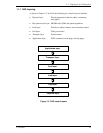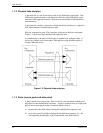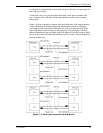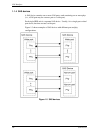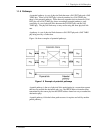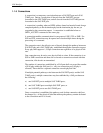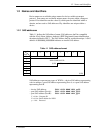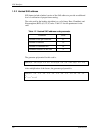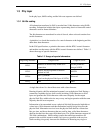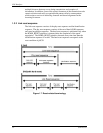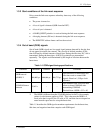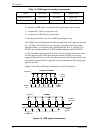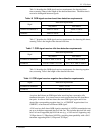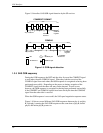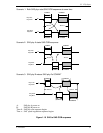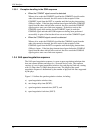
1.3 Phy layer
C141-C013 31
1.3 Phy layer
In the phy layer, 8b10b coding and the link reset sequence are defined.
1.3.1 8b10b coding
All information transferred in SAS is encoded into 10-bit characters using 8b10b
encoding. Information includes data bytes representing data in a frame and control
characters used for frame delimiters.
Ten-bit characters are transferred in units of dwords, where a dword contains four
ten-bit characters.
A primitive is a dword that consists of a control character at the beginning and the
other three data characters.
In the SAS specifications, a primitive that starts with the K28.5 control character
and another one that starts with the K28.6 control character are defined. Table 1.3
shows the usage of special characters.
Table 1.3 Usage of special characters
Beginning character Usage in SAS Usage in SATA
K28.3
Primitive to be used only within STP
connection
All the primitives
except ALIGN
K28.5
ALIGN and most primitives that are
defined in SAS
ALIGN
K28.6
SATA_ERROR
(used on the physical link layer of SATA)
Not used.
Dxx.y Data Data
A single data dword is a dword that starts with a data character.
Running disparity shall be maintained separately on each physical link. During a
connection, expander devices shall convert incoming 10-bit characters to 8-bit
bytes and generate the 10-bit character with correct disparity for the output
physical link. Phys within a device may or may not begin operation with the same
disparity after the reset sequence.
Information to be transmitted across a physical link shall be encoded eight bits at
a time into a 10-bit character and then transmitted serially bit-by-bit across the
physical link. Information received over the physical link shall be collected ten
bits at a time, and those characters that are used for data, called data characters,
shall be decoded into the correct 8-bit data bytes. The 10-bit characters support all
256 8-bit combinations. 8b10b coding ensures that sufficient transitions are
present in the serial bit stream to make clock recovery possible at the receiver.
Such encoding also greatly increases the likelihood of detecting any single or



